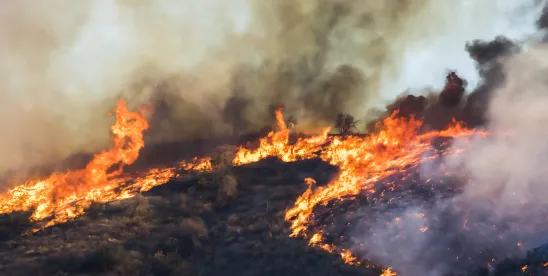AB 238, also referred to as the Mortgage Deferment Act, to add Title 19.1§ 3273.20 et seq. (the “Mortgage Deferment Act” or the “Act”), was introduced in the California legislature on January 13, 2025 to provide essential financial relief to the victims of the Los Angeles County wildfires (including the Palisades and Eaton fires) that continue to burn in multiple locations throughout Southern California. The Mortgage Deferment Act may be heard in committee on February 13, 2025. If implemented, the Act is intended to provide financial relief to those who have lost their homes or livelihood to wildfires by allowing borrowers to request mortgage payment forbearance for up to 360 days, in two increments of 180 days each.
The Mortgage Deferment Act is modeled after the CARES Act, which provided similar forbearance relief to those experiencing financial hardship during the COVID-19 pandemic. To effectuate a request under the Act as currently drafted, the borrower[1] must submit a request for forbearance to the borrower’s mortgage loan servicer and affirm that the borrower is experiencing a financial hardship due to the wildfire disaster. Id. at § 3273.22(a). No additional documentation is required for a request for forbearance, other than the borrower’s attestation to a financial hardship caused by the wildfire disaster. Id. at § 3273.23(a).
Upon receipt of such a request, the mortgage servicer must provide the borrower a forbearance for up to 180 days, which may be extended for an additional period of up to 180 days at the request of the borrower. Id. at § 3273.22(b). Additionally, the mortgage servicer must communicate with the borrower to whom a forbearance has been granted to ensure that the borrower understands that the missed mortgage payments must be repaid, although they may be paid back over time. Id. at § 3273.23(a)-(b).
The proposed legislation prohibits the assessment of additional fees, penalties, or interest beyond scheduled amounts. It also requires an immediate stay of foreclosure efforts, and extends to all aspects of the foreclosure process, including foreclosure-related eviction. Moreover, during the forbearance period, the Mortgage Deferment Act prohibits a mortgage servicer from initiating any judicial or nonjudicial foreclosure process, moving for a foreclosure judgment or order of sale, or executing a foreclosure-related eviction or foreclosure sale. Id. at § 3273.24.
If the Mortgage Deferment Act is implemented, it will be of the utmost importance for mortgage servicers to work closely with borrowers who may have been impacted by the wildfire disaster in California. Servicers should also ensure that borrowers requesting forbearance are properly informed that any missed mortgage payments pursuant to the borrower’s forbearance request ultimately will be required to be repaid to the mortgage servicer. Further, upon implementation, any failure to properly adhere to the Mortgage Deferment Act by mortgage servicers could have significant negative consequences, which could include litigation and/or compliance issues. Servicers should monitor the status of the Act, to ensure that they are prepared to fully comply with its terms, should the Act become law.
[1] The Mortgage Deferment Act, as currently drafted, includes various proposed definitions. “Borrower” is defined as a natural person who is a mortgagor or trustor or a confirmed successor in interest, or a person who holds a power of attorney for a mortgagor or trustor or a confirmed successor in interest. Mortgage Deferment Act § 3273.21(a). “Mortgage loan” is defined as a loan that is secured by a mortgage and is made for financing, including refinancing of existing mortgage obligations, to create or preserve the long-term affordability of a residential structure in the state, or a buy-down mortgage loan secured by a mortgage, of an owner-occupied unit in this state. Id. at § 3273.21(b). “Mortgage servicer” means a person or entity who directly services a loan or who is responsible for interacting with the borrower, managing the loan account on a daily basis, including collecting and crediting periodic loan payments, managing any escrow account, or enforcing the note and security instrument, either as the current owner of the promissory note or as the current owner’s authorized agent. Id. at § 3273.21(c). “Wildfire disaster” means the conditions described in the proclamation of a state of emergency issued by California Governor Gavin Newsom on January 7, 2025. Id. at § 3273.21(d).



 />i
/>i

